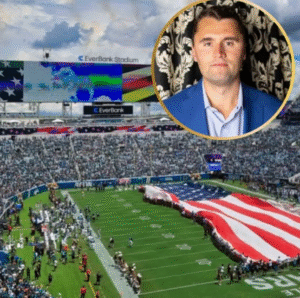
🏈 The Silence That Spoke Volumes
On September 14, 2025, NFL stadiums across the country dimmed their lights, projected Charlie Kirk’s image on jumbotrons, and held moments of silence. Fans bowed their heads. Some wept. Others stood in quiet defiance of political violence. But not every team joined in.
Four NFL franchises—the Baltimore Ravens, Cincinnati Bengals, Detroit Lions, and Minnesota Vikings—opted not to honor Kirk during their Week 2 home games. Their silence wasn’t just absence—it was a statement. And now, that decision is under the microscope.
🧠 Who Was Charlie Kirk?
Charlie Kirk, 31, was a conservative activist and founder of Turning Point USA. He was assassinated while speaking at Utah Valley University, the first stop on his “American Comeback Tour.” A single bullet struck his neck, killing him instantly. The FBI later arrested 22-year-old Tyler Robinson, whose father turned him in after recognizing surveillance footage.
Kirk’s death was politically charged. He was a vocal Trump ally, a frequent media presence, and a polarizing figure. But to many, he was also a husband, father, and advocate for free speech. His assassination triggered vigils across the country and tributes from political leaders—including President Donald Trump, who announced Kirk would be posthumously awarded the Presidential Medal of Freedom.
🏟️ The NFL’s Response: Fragmented and Revealing
The NFL initially mandated a moment of silence during Thursday Night Football between the Packers and Commanders. But by Friday, the league shifted course, leaving tributes up to individual teams.
This created a patchwork of responses:
- Teams that honored Kirk: Dallas Cowboys, Miami Dolphins, New York Jets, New Orleans Saints, Pittsburgh Steelers, Tennessee Titans, Arizona Cardinals, Kansas City Chiefs.
- Teams that declined: Ravens, Bengals, Lions, Vikings, Colts.
The Colts explained their decision, citing a pre-planned tribute to Forrest Lucas, founder of Lucas Oil Stadium. The other four teams offered no public justification.
🔥 The Backlash Begins
Critics quickly pointed out that these same franchises had previously held tributes for George Floyd in 2020. The Ravens organized a National Day of Mourning. The Bengals locked arms in protest. The Lions hosted community events. The Vikings established scholarships in Floyd’s name.
Now, those gestures are being compared to their silence on Kirk. Some see hypocrisy. Others see selective compassion. And many fans are asking: Why honor one life and not another?
📣 The Political Divide
Charlie Kirk was not a neutral figure. His activism, rhetoric, and alignment with Trump made him a lightning rod. For some teams, honoring him may have felt like endorsing his politics. For others, it was simply about condemning violence.
But the NFL’s decision to leave tributes optional exposed a deeper truth: professional sports are no longer apolitical. Every gesture—or lack thereof—is interpreted through a cultural lens.
Some fans applauded the teams for staying out of politics. Others accused them of cowardice. The Saints, who did hold a tribute, reportedly faced boos from their own crowd.
🕯️ What Fans Are Saying
Social media erupted with reactions:
- “The Ravens honored George Floyd but not Charlie Kirk. That tells you everything you need to know.”
- “I’m a lifelong Lions fan. Not anymore.”
- “The NFL should’ve made it mandatory. Violence is violence.”
Others defended the teams:
- “Kirk was divisive. Teams have the right to choose.”
- “Moments of silence shouldn’t be political theater.”
The debate isn’t just about Kirk—it’s about how we mourn, who we honor, and what those choices say about us.
🧠 TL;DR: What This Story Really Means
- Charlie Kirk, a conservative activist, was assassinated during a public event in Utah.
- The NFL allowed teams to decide whether to honor him with a moment of silence.
- Four teams—Ravens, Bengals, Lions, Vikings—declined, sparking backlash and accusations of double standards.
- The controversy highlights the politicization of sports, the complexity of public mourning, and the cultural divide in America.
This wasn’t just a missed tribute. It was a flashpoint—a moment that revealed how fractured our national identity has become. Whether you see the silence as principled restraint or quiet resistance, one thing is clear: the conversation is far from over.
Let me know if you’d like a deeper dive into the political implications, fan reactions, or the broader history of tributes in sports.


